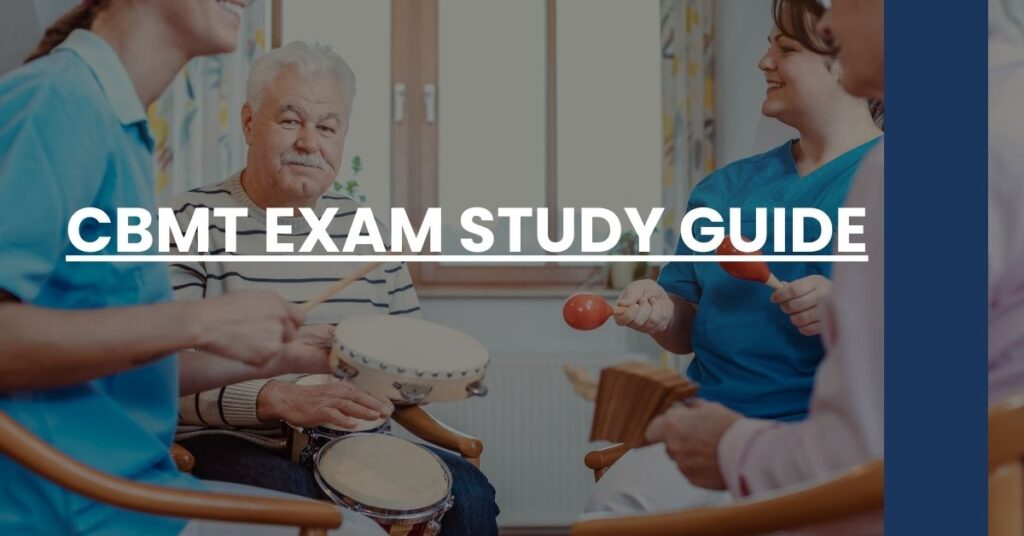Master your CBMT exam preparation with our expertly crafted study guide.
- Structured Study Plans: Tailor your review sessions with optimized schedules.
- Essential Resources: Access a compiled list of vital materials.
- Proven Strategies: Elevate your test-taking confidence with tried-and-true techniques.
Your ultimate CBMT exam study guide journey starts here.
Understanding the CBMT Exam
Embarking on the journey to become a board-certified music therapist is an admirable and challenging quest. At the heart of this journey is the Certification Board for Music Therapists (CBMT) Exam, an essential step towards achieving your MT-BC credential — a recognition of your skills and competencies as a music therapy professional.
What is the CBMT Exam?
The CBMT exam is more than a test; it’s a gateway to professional acknowledgment in the music therapy field. Its robust framework is designed to evaluate your depth of knowledge, practical skills, and ability to apply music therapy principles effectively. Administered via computer at numerous PSI testing centers, the exam encompasses the broad spectrum of skills outlined by the CBMT Board Certification Domains.
Why is the MT-BC credential vital?
Beyond validating your expertise, holding the MT-BC credential signifies your dedication to the highest standards of music therapy practice. It assures clients and employers alike of your commitment to quality care, upheld by the rigor of the CBMT exam.
Structure of the CBMT Exam
As you dive into your cbmt exam study guide, it’s crucial to familiarize yourself with the exam’s structure. The test spans various domains, ranging from assessment and treatment planning to documentation and professional development. To reinforce your confidence, consider the CBMT Self-Assessment Examination — a preparatory tool reflecting the exam’s essence.
Exam Content and Format
Diving deeper into the makeup of the CBMT exam, understanding its content and format is pivotal in your preparation. Knowing what to expect demystifies the exam experience and allows you to strategize effectively.
Key Domains Covered
Based on a thorough practice analysis, the exam covers these quintessential domains:
- Assessment: Evaluating client needs to inform the music therapy process.
- Treatment Planning and Implementation: Crafting and executing personalized interventions.
- Evaluation and Termination of Services: Measuring outcomes and making informed decisions on service continuation.
- Documentation: Accurate and ethical reporting of clinical information.
- Professional Development and Responsibilities: Continuous growth and adherence to ethical standards.
These domains are outlined in detail within the Exam Content Outline, refreshed every five years to ensure relevance to current practice.
Types of Questions and Format
You can anticipate a multiple-choice format that nudges you to apply theoretical knowledge to practical scenarios. This design hones in on your decision-making skills and ability to navigate clinical situations with theoretical backing — a reflection of real-world music therapy practice.
Recommended Study Materials
As you gear up for the CBMT exam, surrounding yourself with the right study materials is like building a support system for your success. Here are some of the top recommended resources to include in your cbmt exam study guide:
- CBMT Exam Candidate Handbook: Your official guidebook, brimming with exam specifics.
- CBMT Scope of Practice: A document detailing professional expectations and standards.
- Key Textbooks: Ground your study on foundational texts in music therapy.
Additionally, explore shared online study guides and notes from your educational journey that mirror the CBMT exam’s scope.
Study Schedule and Time Management
Creating a study schedule is akin to composing a symphony; each section must harmonize with the others. Time management is your conductor — leading you through each segment of preparation with precision and intention.
Crafting an Effective Study Plan
Begin by outlining clear, actionable goals. Break down the domains into manageable topics and allocate time slots for each. Remember, consistency beats cramming every time. It’s not just about the hours you put in; it’s how you use those hours effectively.
Achieving Study-Life Balance
Strike a balance between rigorous study and important downtime. Allowing yourself breaks to recharge ensures that your study sessions are productive and not marred by burnout. Keep reminding yourself that a well-rested mind is a foundation for retention and understanding.
Stick to Your Schedule
Consistency is key. Adhere to your study plan, and make adjustments as necessary. If you find a topic needs more attention, reallocate your time but avoid overextending your sessions. And throughout your journey, stay motivated. This isn’t just an exam; it’s a step towards a fulfilling career helping others through the power of music therapy.
Practice Exams and Sample Questions
Practice, they say, makes perfect. This is especially true when it comes to acing the CBMT exam. Utilizing practice exams and sample questions is an irreplaceable part of your cbmt exam study guide plan. Through practice, you familiarize yourself with the exam’s structure and pacing, and you also identify areas where you might need further study.
The Role of Practice Tests in Preparation
- Self-Assessment Examinations (SAE): The CBMT provides two Self-Assessment Examinations which reflect the actual exam in format and content coverage. Engaging with these can gauge your strengths and weaknesses.
- Immediate Feedback: Practice tests often provide explanations for each answer. This feedback is invaluable as it consolidates your learning and clarifies any misunderstandings.
Finding Quality Practice Material
When searching for quality practice exams and sample questions, ensure they align with the CBMT’s Exam Content Outline. Your search will lead you to resources such as the Exam Candidate Handbook, which includes practice questions designed to reflect the actual exam rigorously. If you’re looking for additional resources, joining professional groups or forums can be a treasure trove of shared materials and experiences from past test-takers.
Test-Taking Strategies
Entering the CBMT exam room with robust test-taking strategies can make the difference between a stressful experience and a confident performance. Integrating these strategies into your study schedule will ensure that you wield them effectively on the big day.
Answering Multiple-Choice Questions
- Eliminate Obviously Wrong Answers: This narrows down your choices and increases the probability of selecting the correct one.
- Read Questions Carefully: Sometimes, the phrasing contains hints that point to the correct answer, or it might be easy to misinterpret what is being asked.
Managing Exam Time
- Pace Yourself: Keep an eye on the clock, but don’t let it rush you. Practice pacing yourself with timed sections during your study sessions.
- First Responses: Often your first response is the right one. Trust your instincts unless you have compelling evidence to change an answer.
Dealing with Test Anxiety
- Breathing Techniques: Simple deep-breathing exercises can help calm your nerves.
- Positive Visualization: Imagine yourself successfully completing the exam. This positive visualization can create a sense of readiness and reduce anxiety.
Review Courses and Workshops
Sometimes a structured, in-person or online learning environment can reinforce your self-study efforts and fill gaps in your knowledge. Let’s look at some of the formal preparation opportunities available for the CBMT exam.
The Benefits of Review Courses
Attending review courses or workshops provides several advantages:
- Expert Instruction: Gain insights from instructors who are intimately familiar with the CBMT exam’s content and structure.
- Collaborative Learning: Share experiences and learn alongside peers who are also preparing for the exam.
Workshop Topics and Coverage
Workshops often cover all the key domains of the exam, providing a comprehensive overview that can complement your solo study sessions. While I don’t have specific resources to point you to, keep an eye on professional music therapy associations or CBMT announcements for upcoming opportunities.
Self-Care and Stress Management
As much as understanding the content is vital, taking care of your well-being is equally important. Effective self-care and stress management techniques should be a non-negotiable part of your cbmt exam study guide strategy.
Physical and Mental Health During Study
- Regular Exercise: Maintaining an exercise routine can relieve stress, enhance focus, and improve mood.
- Nutritious Diet: A balanced diet fuels your brain and keeps your energy levels stable.
Stress-Reduction Techniques
- Mindfulness-Based Interventions: Methods like MBSR (Mindfulness-Based Stress Reduction) have been shown to effectively lessen anxiety. Consider integrating mindfulness practices into your routine.
- Music-Based Stress Relief: As a future music therapist, don’t forget the power of music. Utilizing music consciously for relaxation and emotional processing can be extremely helpful.
The Importance of Breaks
- Scheduled Breaks: Step away from your study materials at regular intervals to prevent burnout.
- Social Interaction: Engage in light-hearted activities with friends or family to balance your study time with social wellbeing.
Staying Updated and Networking
Staying informed and connected with the music therapy community is an indispensable strategy not only for exam preparation but also for your future career. Let’s explore ways to remain engaged as you ready yourself for the CBMT exam.
Keeping Abreast of CBMT Exam Changes
Always monitor the CBMT website and associated updates to catch any changes in the exam’s structure, content, or procedural nuances.
Connecting with Peers
Your fellow music therapy students or practitioners can be an invaluable source of support and resources:
- Study Groups: Join or form study groups for mutual motivation and knowledge exchange.
- Online Forums: Participate in online forums or social media groups where you can ask questions and share tips.
Conclusion
As we recap the fundamentals of preparing for the CBMT exam, remember that this guide is not just about passing a test. It’s about solidifying the cornerstones of your future career to serve others through music therapy. Embrace each step of your preparation with positivity and persistence and know that each hour of study is an investment in your professional journey.
Your path to becoming a board-certified music therapist is paved with dedication, discipline, and a compassionate heart. This cbmt exam study guide is your companion along the way, lighting the road toward success. Go forth with confidence, knowing that you’re preparing to make a difference in countless lives through the healing power of music.
CBMT Exam Study Guide: Essential tips and resources for music therapists to prepare and succeed in board certification exams.

